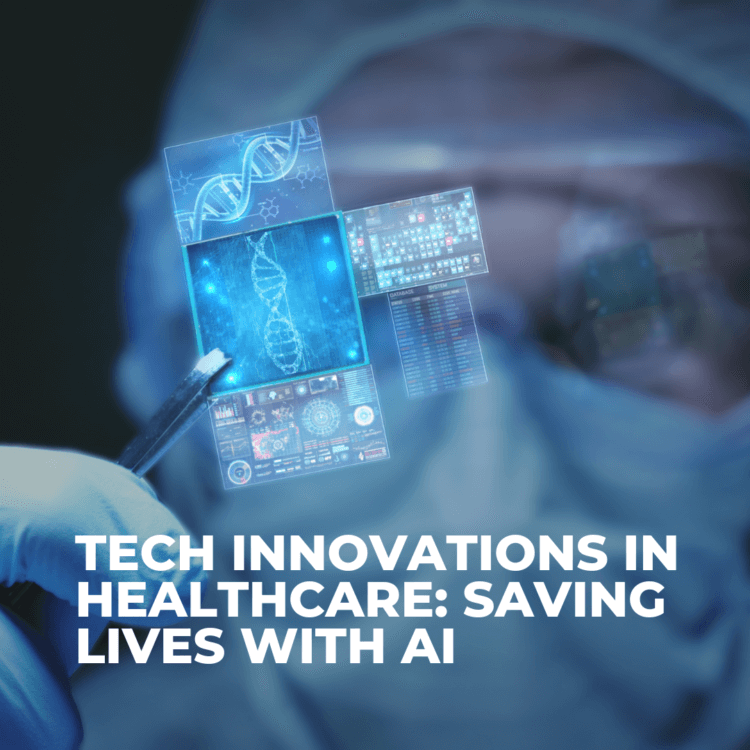Technological innovations, particularly those involving Artificial Intelligence (AI), are significantly impacting the healthcare industry, ultimately saving lives and improving patient care in various ways. Here are some key ways in which AI is revolutionizing healthcare:
Diagnosis and Early Detection:
AI-powered diagnostic tools can analyze medical images, such as X-rays, MRIs, and CT scans, with incredible accuracy. Machine learning algorithms can quickly identify abnormalities, helping physicians detect diseases like cancer, fractures, and neurological conditions in their early stages when treatment is most effective.
Personalized Treatment Plans:
AI analyzes patient data, including genetics, medical history, and real-time monitoring, to create personalized treatment plans. This approach ensures that treatments are tailored to an individual’s unique needs, optimizing outcomes and minimizing side effects.
Drug Discovery:
AI accelerates drug discovery by analyzing vast datasets of chemical compounds and their potential effectiveness in treating diseases. This reduces the time and cost of bringing new drugs to market, potentially leading to breakthroughs for previously untreatable conditions.
Predictive Analytics:
AI models can predict disease outbreaks and patient readmissions. This allows healthcare providers to allocate resources more efficiently and intervene before medical conditions worsen.
Remote Monitoring:
Wearable devices and IoT sensors allow continuous remote monitoring of patients’ vital signs and health metrics. AI analyzes this real-time data to alert healthcare providers to potential issues, enabling timely interventions and reducing hospital readmissions.
Natural Language Processing (NLP):
NLP algorithms help convert unstructured data, such as doctors’ notes and patient records, into structured, searchable information. This enhances the accuracy and efficiency of diagnosis and treatment planning.
Robotic Surgery:
AI-powered robotic surgical systems enhance the precision and dexterity of surgeons, reducing the risk of human error and enabling minimally invasive procedures. These technologies are particularly valuable for complex surgeries.
Drug Adherence:
AI-driven apps and chatbots can help patients adhere to their medication schedules by sending reminders and answering questions about their medications and treatment plans.
Healthcare Chatbots:
AI-powered chatbots provide 24/7 access to healthcare information and assistance. They can help users assess symptoms, schedule appointments, and offer general health advice.
Fraud Detection:
AI algorithms can analyze healthcare claims and billing data to identify fraudulent or erroneous charges. This helps prevent financial losses and ensures that healthcare resources are used effectively.
Genomic Medicine:
AI is instrumental in analyzing vast genomic datasets to identify genetic markers associated with diseases. This information helps in the development of personalized medicine and targeted therapies.
Mental Health Support:
AI-driven mental health apps and chatbots provide valuable support for individuals dealing with mental health challenges. These tools offer resources, coping strategies, and even real-time emotional support.
Population Health Management:
AI helps healthcare systems manage the health of entire populations by identifying trends and risk factors. This information informs public health policies and interventions.
Ethical and Regulatory Considerations:
As AI becomes more integrated into healthcare, there is a growing need for ethical guidelines and regulatory frameworks to ensure patient privacy, data security, and responsible AI use.
In conclusion, AI-driven innovations in healthcare are transforming the industry, making diagnosis and treatment more accurate, efficient, and accessible. These advancements are not only improving patient outcomes but also increasing the efficiency of healthcare delivery and reducing costs. As AI continues to evolve, its role in healthcare is likely to expand, ushering in a new era of personalized and data-driven medicine that saves lives and enhances the quality of healthcare worldwide.










No Comments
Leave Comment